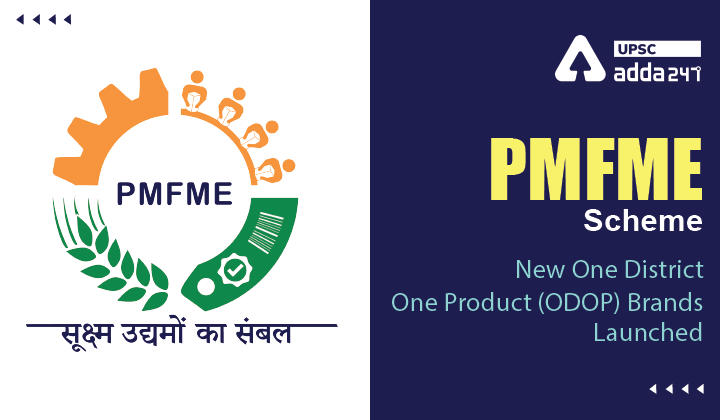Table of Contents
PMFME Scheme- Relevance for UPSC Exam
- GS Paper 2: Governance, Administration and Challenges- Government policies and interventions for development in various sectors and issues arising out of their design and implementation.
PMFME Scheme in News
- Recently, the Ministry of Food Processing Industries launched Three One District One Product (ODOP) brands under the Pradhan Mantri Formalisation of Micro food processing Enterprises (PMFME) Scheme.
- The Ministry of Food Processing Industries has signed an agreement with NAFED for developing 10 brands of selected 20 ODOPs under the branding and marketing component of the PMFME scheme.
Newly launched ODOPs under PMFME Scheme
- All the products are available on E-commerce platforms, and prominent retail stores across India.
- 7 ODOP Brands and 9 Products have been successfully launched in collaboration with NAFED. These are listed below-
| Brands | District | Products |
| Cori Gold | Kota, Rajasthan | Coriander Powder |
| Makhana King | Darbhanga and Muzaffarpur from Bihar | Plain and Chatpata Makhana |
| Dilli Bakes | Delhi | Cookies and Rusk |
| Amrit Phal | Gurgaon, Haryana | Amla Juice |
| Madhumantra | Saharanpur, Uttar Pradesh | Multiflora Honey |
| Somdana | Thane, Maharashtra | Millet Flour |
| Kashmiri Mantra | Kulgam, Jammu and Kashmir | Red Chilli Powder |
PMFME Scheme: ‘Delhi Bakes’ First ODOP
Key Details about Newly launched Products under ODOPs
- Brand Madhurmithas: It has introduced Jaggery Powder and has been exclusively developed under the ODOP concept for the district Muzaffarnagar, Uttar Pradesh.
- The product is a sweetener without any chemicals and also healthier and more delicious than sugar.
- Brand Anaras: It has been developed under the ODOP concept for dried spicy pineapple from the district Ri Bhoi, Meghalaya.
- The product has been made from handpicked pineapples, naturally sundried and flavored with a secret spice mix to give it an irresistible unique taste.
- Brand Pind Se for Mango Pickle: it brings you the authentic taste of Ghar ka bana aam ka achaar.
- This delightful pickle is prepared from the choicest mangoes, premium quality ingredients, and a traditional recipe.
- The product is hand-made in small batches to maintain quality and consistency.
- Kashmiri Mantra and Madhumantra: The use of traditional mixed masalas is an integral part of the Kashmiri vegetarian and non-vegetarian cuisines.
- Locally called ‘ver’, the masala paste in Tikki form is the second product to be launched after Kashmiri Lal Mirch under the brand.
- Lemon Honey: It offers an element of uniqueness to plain old honey by infusing it with high-quality lemon extract.
- Simply adding it to your favorite beverage can transform it in a whole new way.
About PMFME Scheme
- About: the Pradhan Mantri Formalisation of Micro food processing Enterprises (PMFME) Scheme was Launched under the Aatmanirbhar Bharat Abhiyan.
- PMFME Scheme is a centrally sponsored scheme.
- Objective: PMFME Scheme aims-
- To enhance the competitiveness of existing individual micro-enterprises in the unorganized segment of the food processing industry and
- To promote formalization of the sector and provide support to Farmer Producer Organizations, Self Help Groups, and Producers Cooperatives along their entire value chain.
- Funding: An outlay of Rs. 10,000 crore for over a period of five years from 2020-21 to 2024-25 has been allotted for the PMFME Scheme.
- Targets: The PM FME scheme envisions directly assisting the 2,00,000 micro food processing units for providing financial, technical, and business support for the up-gradation of existing micro food processing enterprises.
About ODOP scheme
- About: PMFME Scheme adopts one district one product approach to reap the benefits of scale in terms of procurement of inputs, availing common services, and marketing of products.
- ODOP scheme Full form: ODOP stands for “One District One Product”.
- ODOP identification: The States would identify the food product for a district, keeping in perspective the focus of the scheme on perishables.
- ODOP benefits: Key Benefits of the ODOP scheme are listed below-
- Support for agricultural products would be for their processing along with efforts to reduce wastage, proper assaying, and storage and marketing.
- For providing support to existing individual micro-units for capital investment, preference would be given to those producing ODOP products.
- New units, whether for individuals or groups would only be supported for ODOP products.
- Support for common infrastructure and marketing & branding would only be for ODOP products.
- In case of support for marketing & branding at the State or regional level, the same products of districts not having that product as ODOP would also be included.
One District One Product (ODOP) Scheme





 TSPSC Group 1 Question Paper 2024, Downl...
TSPSC Group 1 Question Paper 2024, Downl...
 TSPSC Group 1 Answer key 2024 Out, Downl...
TSPSC Group 1 Answer key 2024 Out, Downl...
 UPSC Prelims 2024 Question Paper, Downlo...
UPSC Prelims 2024 Question Paper, Downlo...
